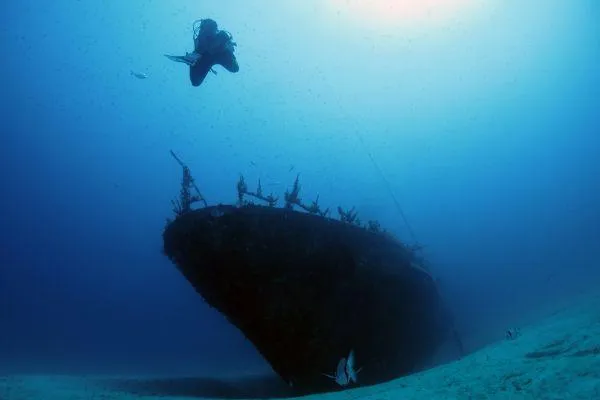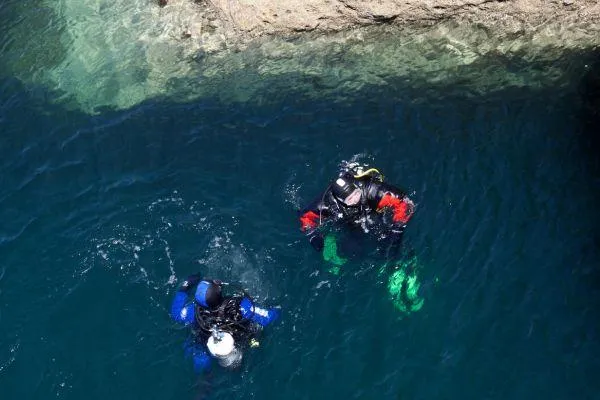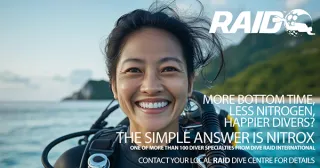DIVE RAID UK & MALTA
Embark on Unforgettable Adventures: Discover Your World with Us, Where Every Journey Begins
Grow your skills, build your comfort, with RAID
We are the authorised RAID regional office for the regions of UK, Ireland, Malta, Monaco, Denmark, Sweden, Norway, Finland , Jordan. Contact us if you're interested in joining RAID.

FEATURED RAID DIVE CENTRES

DIVE PRO & CENTRE Crossovers
Cross Over Today & start bringing positive change to the dive industry
There is more to our agency than Zero-Fee-Membership… but that’s a fine start!
RAID offers the right professional DMs Instructors, ITs and dive shop owners a slick, no-fuss way to join our winning team. There are more than 1001 reasons to cross over to RAID…
RECENT NEWS & BLOGS
Keep Updated
Go Dive Show
Join Dive RAID at Go Dive Show, Booth 680! Meet top trainers, explore our cutting-edge training, and grab exclusive RAID merchandise! 🌊 #DiveTheRAIDWay ...more
Events
February 20, 2025•1 min read

Nitrox Is The Answer
Signing up for a nitrox class seems to be a no-brainer to some divers; they understand the benefits right away and have no hesitation taking the plunge and enjoying the benefits. ...more
Training
February 12, 2025•1 min read

Dive Into Excitement at the Go Diving Show
Join us at the Go Diving Show! Visit us at Booth 680 for exclusive giveaways, discounts, expert talks, and a chance to win a diving holiday! Don’t miss out—get your tickets now! ...more
Events ,News
January 31, 2025•3 min read

Frequently Asked Questions
Your Questions Answered
Can I start the RAID course before I contact a Dive Centre?
Yes, you may start the theoretical section just log on and follow the registration procedures. To complete the practical learning you will have to contact and train through a RAID Dive Centre.
Do I have to complete all the academic learning before I contact a Dive Centre?
No, you can contact a RAID Dive Centre, anytime before, during or after your academic on-line learning.
Do I have to complete the in water training at my local Dive Centre?
You can choose any RAID Registered Dive Centre for your in water training.
From the time I register until I get certified, how long do I have?
12 months.
Can my family register for one course and we all get certified?
You can register for one course, and you will only get one certification. Each member of the family must earn his/her own certificate.
Do I have to fully complete one program before I can start the next academic learning program?
You can register for as many academic on-line programs as you like, although you need to meet the prerequisites prior to any in water training.
Can I do a 'Try Dive' first before I decide to do a course?
Yes, just choose or contact a RAID registered Dive Centre and make arrangements with them for a Try Dive.
What happens if after 12 months I have not had time to get certified?
You need to re-purchase your course and start again as a lot of information may have been forgotten and revision is always safe.
What is the minimum age?
12 years to become a RAID diver, and 15 years for Master Rescue / Level 3 and above.
Can I complete confined water with one Dive Centre and Open Water training with another?
Yes, you may want to do confined water locally, and travel to a tropical island for your open water.
Can I go directly to the exam, without completing the Quick Quiz?
No, the quick quiz is an important prerequisite.
How many times can I re-write the exam?
10 times, then if you don't pass you need to contact your Instructor or Dive Centre for additional help.
Can I have someone to help me when I write the Quick Quiz and Exam?
No
Can I print out the PDF's from the academic presentation sections?
Yes. NOTE: only online materials are valid RAID documents.
Can I print out the PDF's from the academic presentation sections?
Yes. NOTE: only online materials are valid RAID documents.
REVIEWS
RAID UK & MALTA
Our focus is to bring positive change to the scuba and freediving industries. Safe, inclusive, no shortcuts: a thoroughly modern approach… The RAID Way™
RAID is a fast growing, modern, energized diver training agency. We aren’t distracted by anything else than delivering and supporting dive training.
@ 2024 Copyright New Horizon Digital




